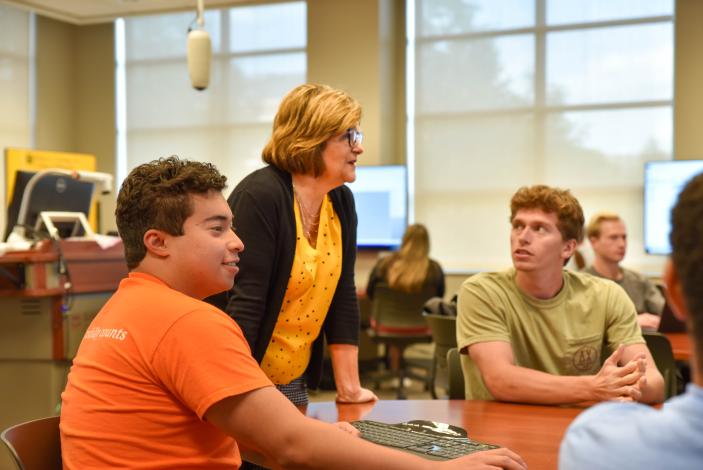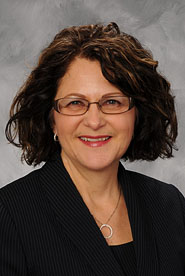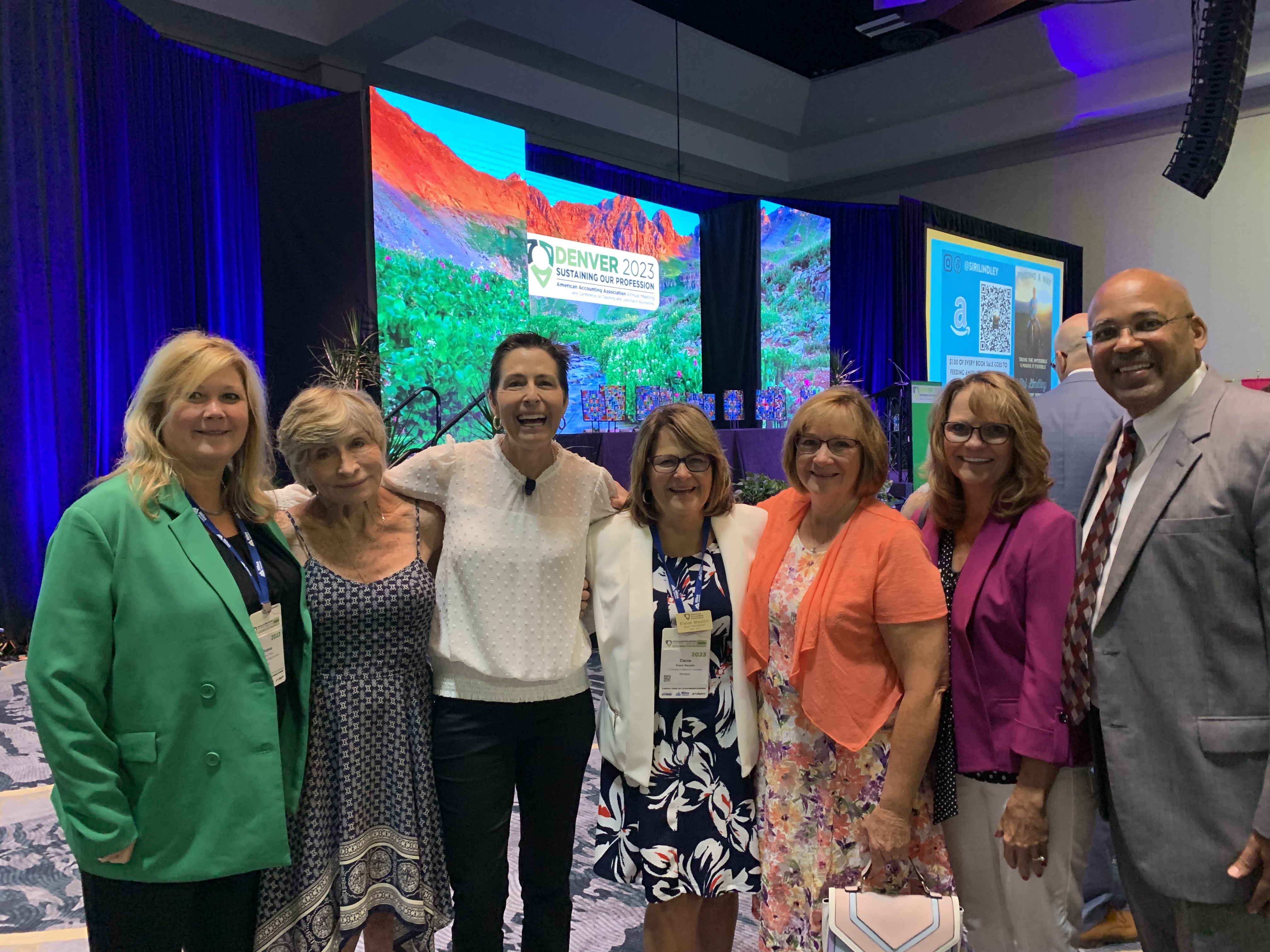
Embracing challenges and championing change: Elaine Mauldin receives prestigious award for outstanding service

Elain Mauldin, FORVIS Distinguished Professor in the School of Accountancy, was recognized in August by the American Accounting Association (AAA) with its Outstanding Service Award.
By Maria Yore
Elaine Mauldin could seemingly talk all day about her research, her students and current trends in the accountancy field and how to move it forward. But when it comes to her own academic success, the honors she has received and the impact she has made, she’s a bit more hesitant to speak.
Mauldin was recognized in August by the American Accounting Association (AAA) with its Outstanding Service Award. According to the AAA, it’s a prestigious award intended only for rare events or milestones achieved by a member, outside of their education and research contributions.
A past president of the AAA and two-term former editor of one of the association’s nationally reputed journals, Mauldin currently serves as a FORVIS Distinguished Professor in the University of Missouri’s Robert J. Trulaske, Sr. School of Accountancy. Most would agree she fulfilled the requirements for the award, and then some.
A campus calling
An accomplished accountant, researcher, author, educator, wife and mother, the path to where Mauldin is today did not come easy. As a fifth generation Nebraskan growing up in a small town, opportunities and resources were limited. Mauldin’s continual thirst for knowledge propelled her to pave her own path, becoming the first person in her family to attend college and the only one to ever leave the state.
“I was always interested in academics. I love them. I loved going to college, I love getting degrees. I’m kind of a nerd that way,” she said.
Upon graduation from the University of Nebraska-Omaha, Mauldin found her way into a career in public accounting. She again forged her own success, becoming just the second female to be hired by her firm. From there, she moved around a bit and did some nonprofit work before becoming the chief financial officer of a construction company, where she spent 11 years.
“I was really enjoying it and liked working with the CEO. But I came to a point where I either had to move laterally somewhere or into operations, and I really didn’t want to move into operations,” Mauldin recounted. “I just wasn’t interested in it, and I didn’t think I’d be that good at it. Maybe I was selling myself short. I don’t know. At any rate, I just didn’t want to do it.”

After 17 years in practice, Mauldin decided to go back to school. At the University of Nebraska-Lincoln, she was able to continue raising her two young girls while pursuing her PhD. Around that same time, her family fell in love with Missouri. “We had friends at the Lake of the Ozarks, so we ended up taking our boat there and really loved it. And then we ended up buying a condo there,” Mauldin said. “And our friends were always saying, ‘Elaine, you just need to get a job at Mizzou. Just get a job!’” But I was always explaining that academia doesn’t work that way. They need to have a position open when I graduate, for one. And two, they have to want me.”
As it turns out, some things are just meant to be.
Resources and rewards
Mauldin started working for the University of Missouri as an assistant professor in 1997. More than 26 years later, she’s still at Mizzou, now as a full professor, researching and teaching graduate students information systems and auditing. While much has changed over the years, including the building, program, classes and students, her passion for learning remains.
“I still like research to this day. It’s a perfect job for me. If you get bored in academia, it’s your own fault because you get to pick your research projects and you get to pick co-authors,” she said. “You can change your classes and over time I’ve taught different things. And then you get into the service stuff and that’s very appealing to me.”
Among Mauldin’s accomplishments at the university is her title of FORVIS Distinguished Professor. She was recognized early in her academic career with the title, which was first supported by BKD before its merger in 2022. According to FORVIS, a nationally ranked public accounting and professional services firm, the named designation provides well-earned, national recognition.
“Reflecting on my years at Mizzou, one of the continuing highlights has been a strong relationship with BKD, now FORVIS,” said Mauldin. “I am proud to be the FORVIS Distinguished Professor, and I thank them for their support. Without a strong partnership with practice, we would not be able to maintain the high quality of our program in the School of Accountancy.”
Firsts, challenges and changes
Of course, there have been challenges over the years. Of recent note, and part of the reason Mauldin suspects she was recognized by the AAA, was her extensive work during the Covid-19 pandemic. As the rest of the world shut down, Mauldin continued to work long days, often seven days a week, for months on end. She was mid-way into her President-Elect year of the AAA in 2020, when the association’s CEO and CIO announced they were leaving, forcing the board, led by Mauldin as President-Elect, to find a replacement CEO, just weeks before the country shut down.
The board successfully hired a CEO starting about the same time Mauldin started her President year.
“I spent the year helping the new CEO transition. We also moved to all virtual meetings, and we had to deal with the publication process slowing down,” Mauldin recounted. “And when the George Floyd murder happened, we issued a statement that was met with Black faculty telling us we didn’t really support them, and they never felt like they belonged.”
That’s when Mauldin says the AAA started some serious education and changes. Since 2020, the association has increased its representation and has developed courses to help educate and certify members on several initiatives, including a module on inclusive classrooms.
“We increased the representation of our journals’ editors and reviewers. We really looked hard at all our publication policies for evidence of discrimination, even if unintended, and made a number of changes in the organization,” Mauldin said. “And truly, it was a great time of personal growth for me. It’s helped my classroom. It’s helped my research. I know I’m a better, more rounded person as a result of all of that.”
Even though Mauldin’s tenure as immediate Past President came to an end in 2022, she continues her work with the AAA.
“It was a lot that went on, but [the AAA] has been very kind to me,” she said. “They didn’t have to give me an award. I didn’t do any of this to get an award.”
Mauldin was presented with the award at the association’s annual meeting in Denver this past August. Making the occasion even more special was the opportunity to have her sisters by her side.
“They came along with me to the luncheon as I got the award,” she said. “It was special, and we really had a good time.”
Mauldin says she can’t think about any of her accomplishments without the support she has received from MU, the Trulaske College of Business and School of Accountancy. From resources in the classroom, to her research and beyond, Mauldin says the university has helped her in a big way.

“They’ve been really great about giving me some release time and additional resources when needed for my teaching or research,” she said. “For example, in my graduate course, Audit of Internal Control, I have received updated software and training, as needed, to provide the latest technological innovations in my classroom.”
Mauldin says the university’s willingness to provide continual support in technology and updated research databases has been crucial. She says she has always been able to obtain the data needed for her research, which is a key ingredient to any discovery in the world of accountancy, and a means of success for her herself, her colleagues, and the University as a whole.
Looking ahead
As the pandemic and responsibilities of the AAA have settled a bit, Mauldin is back on campus doing what she enjoys most: teaching her favorite classes, working with colleagues on new and continuing research projects and helping students with theirs. She admits as the years go by, her students seem to get younger and younger. But despite current generational trends across the country, Mauldin says her students seem just as motivated as they’ve been in years past.
“I’m likely older than [their] parents, so that’s kind of a strange thing. But I find I just admit it and we laugh about it. I teach graduate classes now, so by the time they get to me, my colleagues have all helped them figure it out,” she said, laughing. “I know they talk about generations changing and I’m sure they do at some level, but when you have college students at the graduate level, you’re not looking at the whole population of 20-year-olds. You’re looking at a smaller microcosm – those who value education. They want to be here, clearly. They want to do accounting. They mostly all have jobs. They’re very concerned about the CPA Exam. Some of that never changes.”
What does change consistently is technology, both on campus and in practice. But that’s another reason why Mauldin loves to teach. She says she takes time every year to update her classes as she learns new technology herself. She, along with many of her colleagues, are currently keeping a keen eye on artificial intelligence, like the increasingly popular application Chat-GPT.
“We have to figure out this artificial intelligence because in a sense it’s an extension of big data,” she explained. “But even regulators are like, ‘Oh wow, it’s not going away.’”
Some of Mauldin’s own recent research found that regulators were dragging their feet when it came to better understanding areas of big data, like the use of data and analytics applications. Specifically, Mauldin and her colleagues looked at auditing firms being audited themselves. Often, firms are reluctant to take full advantage of certain data and analytic methods because it’s unclear how their external reviewers will view their practices. The researchers found that external reviewers did, in fact, view those procedures as of lower quality, because they took less effort than traditional ways. But Mauldin says, those reviewers were not considering all the time and effort the firms were putting in on the front end to actually build the technology; therefore, perceiving the procedures as insufficient.
“Really the take-away from that paper is that the regulators need to step up,” Mauldin explained. “The regulators need to provide guidance and train their external reviewers. That’s kind of been an uphill battle, but artificial intelligence is making them wake up. It’s just getting everybody to figure out what the new normal is. It’s really interesting.”
Mauldin has written more than 20 peer-reviewed research papers to date. She has already left a lasting impact within the accounting industry. Despite her many achievements, she remains grounded and humble. She does take pride in her ability to make a difference, even if it’s, as she says, “at the margin.”
Mauldin says Mizzou has been a great place to build her career. In more than 25 years, she has never found a reason to go elsewhere. The resources provided throughout her tenure, along with the colleagues she’s worked with along the way, have not only fueled her passion for research, but have fueled the research and learning of so many others, including her students.
“I have worked with my colleagues, including faculty and doctoral students, as co-authors and have benefited from generous feedback given at research workshops, and just informal conversations,” Mauldin said. “We are a research active faculty and that helps us all be more successful.”